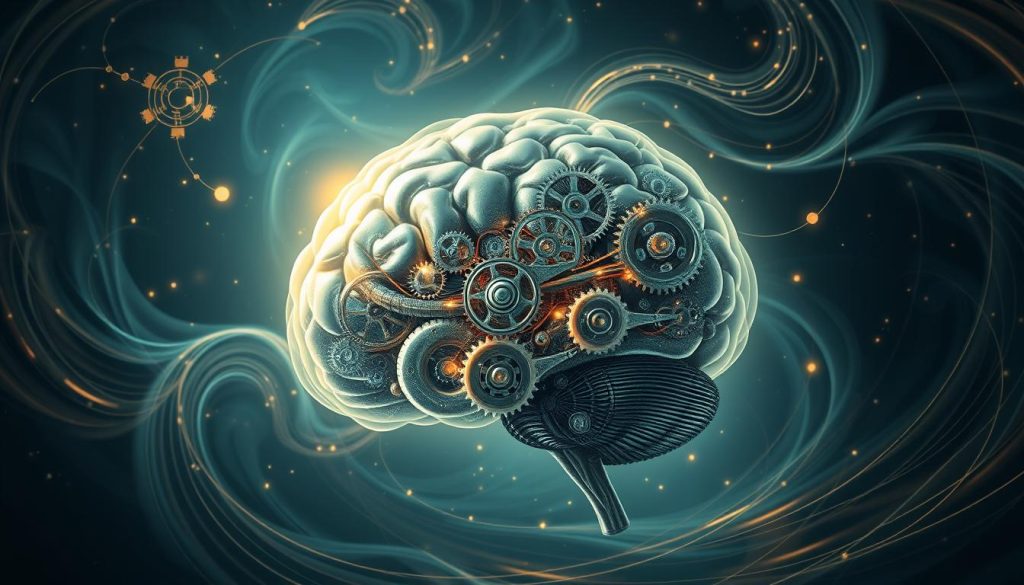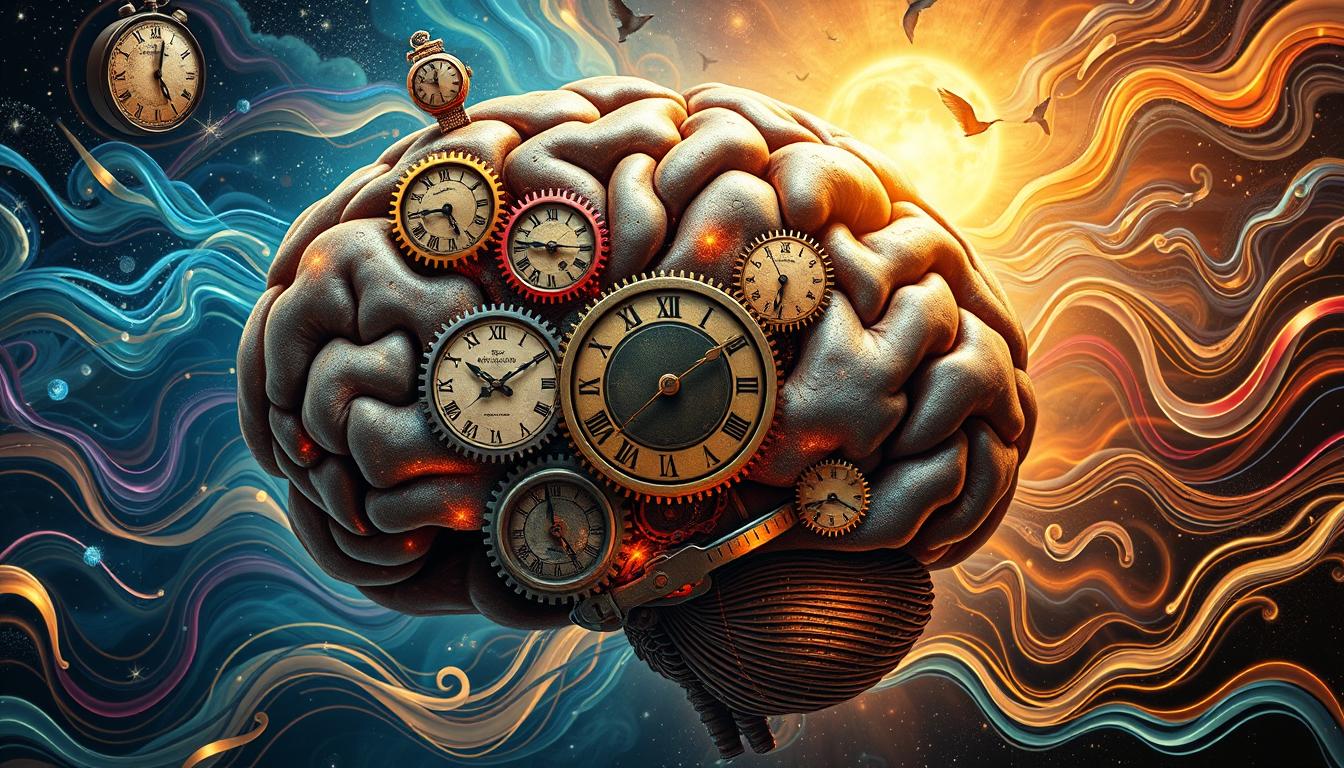Learning about my circadian rhythm and brain clock is key to better sleep and well-being. These rhythms control my physical, mental, and behavioral changes. They are mainly influenced by light and darkness.
By understanding how these rhythms impact my day, I can boost my productivity and mental health. In this article, I’ll explore the circadian rhythm and its role in my body clock. This knowledge will help me live a healthier, more balanced life.
What is Circadian Rhythm?
Circadian rhythm is about the natural cycles that control when we sleep and wake up. These cycles usually last 24 hours and are influenced by light and temperature. It’s important to know how these internal clocks work in all living things.
The Science Behind Circadian Rhythms
The study of circadian rhythms combines biology, psychology, and environmental science. It shows that these rhythms are key to staying healthy. They affect hormone levels, when we eat, and brain activity.
When our circadian rhythm gets disrupted, it can mess with our mood and health. So, keeping a regular sleep schedule is crucial.
Historical Background and Discoveries
Research on circadian rhythms started in the 18th century. French botanist Jean-Jacques d’Ortous de Mareuil noticed plants followed a 24-hour cycle. Later, in the mid-20th century, American biologist Franz Halberg built on this work.
He greatly helped us understand the role of circadian rhythms in our lives.
How Your Brain Clock Works
The brain clock is key to managing my body’s rhythms. It’s fascinating to learn about the science behind it. This knowledge helps us understand how our internal clocks work and stay in sync with the world around us.
Neuroscience of the Brain Clock
At the core of my brain clock is the suprachiasmatic nucleus (SCN), found in the hypothalamus. This group of neurons responds to light from my eyes. It’s the master controller of my body’s rhythms, affecting sleep, hormone levels, and body temperature.
The Role of the Suprachiasmatic Nucleus
The SCN is like the conductor of my internal clock. It makes sure my body’s rhythms match the day-night cycle. When light hits my retina, the SCN adjusts my internal clock. This helps me stay alert during the day and sleep at night.

Factors that Influence Circadian Rhythm
Understanding what affects our circadian rhythm is key to better sleep and health. Each factor plays a big role in how well our internal clock works. Here, we look at how light, diet, sleep, and lifestyle choices impact this system.
Light Exposure and Its Impact
Light exposure is a major factor in our circadian rhythm. Natural sunlight helps reset our internal clock daily. This keeps our sleep-wake cycle steady. But, artificial light, especially from screens, can harm sleep.
Blue light from phones and computers can stop melatonin production. This often leads to poor sleep.
Food and Sleep Associations
Eating habits and sleep are closely connected. Irregular eating can confuse our circadian system, leading to bad sleep. For example, eating heavy or sugary meals before bed can upset our natural rhythms.
Regular eating helps keep a stable sleep schedule and improves health.
Stress and Lifestyle Choices
Stress and lifestyle choices greatly affect our circadian rhythm. Irregular sleep schedules can make our body’s clock and daily life out of sync. Too much caffeine can also make it hard to relax at night.

| Factor | Description | Impact on Circadian Rhythm |
|---|---|---|
| Light Exposure | Natural sunlight and artificial light | Regulates sleep-wake cycles; too much blue light disrupts melatonin |
| Diet | Meal timing and composition | Irregular eating patterns can misalign circadian signals |
| Stress | Daily life stressors and anxiety | Can create sleep disturbances, affecting overall rhythm |
| Lifestyle Choices | Sleep schedules, caffeine intake, and exercise | Inconsistent patterns can lead to misregulated rhythms |
Circadian Rhythm and Brain Clock: The Connection
The link between circadian rhythm and brain clock is key to my health. It affects my sleep, mood, and energy. When they’re in sync, I feel sharper and more productive.
But, when they’re off, I struggle to stay focused or feel tired when I shouldn’t. Keeping them in harmony helps me stay alert and clear-minded. It shows me the importance of healthy habits that keep them aligned.
Here’s a summary of how this connection affects my life:
| Aspect | Positive Influence | Negative Impact |
|---|---|---|
| Energy Levels | Increased energy throughout the day | Afternoon slumps and fatigue |
| Mood | Improved mood and emotional stability | Irritability and mood swings |
| Cognitive Function | Enhanced focus and mental clarity | Difficulty concentrating and decision-making |

Disruptions to Your Circadian Rhythm
Exploring circadian disruptions has shown me their big impact on health. Sleep issues like insomnia and sleep apnea mess up my nights. They make me feel tired and can lead to serious problems like anxiety and heart disease.
How Sleep Disorders Affect Your Health
Looking into sleep disorders, I see how they tie to health problems. Here are some common effects:
- Increased stress levels
- Difficulty concentrating and memory issues
- Higher risk of obesity and diabetes
- Cardiovascular complications
- Greater susceptibility to mental health issues
Modern Lifestyle Challenges
Our modern lives make it hard to keep a regular sleep schedule. Screens and irregular work hours make it tough. My body struggles to find balance between work and rest. Here’s a table showing lifestyle factors that mess with our circadian rhythm:
| Lifestyle Factors | Effects on Circadian Rhythm |
|---|---|
| Extended screen time before bed | Delays melatonin production, making it harder to fall asleep |
| Irregular meal times | Confuses the body’s internal clock |
| Shift work | Disrupts natural sleep-wake cycles |
| Lack of physical activity | Reduces sleep quality and increases fatigue |
| High-stress environments | Contributes to insomnia and sleep disturbances |
Optimal Sleep-Wake Cycles
Getting the right amount of sleep is key to feeling good. I watch when I’m most awake and when I start to feel tired. This helps me figure out the best times for me, making my days more productive and full of energy.
Identifying Your Sleep Patterns
I use sleep journals and apps to track my sleep. They help me see patterns, like sleeping better on some days or after certain activities. Knowing these patterns helps me match my daily life to my body’s natural sleep cycle.
Tips for Improving Sleep Quality
Improving sleep starts with a calm bedroom. I keep it dark and quiet to create a peaceful space. Going to bed and waking up at the same time every day is also crucial.
Adding healthy habits like meditation or deep breathing helps me relax at night. These habits improve my sleep quality and keep me in sync with my body’s natural rhythm.

